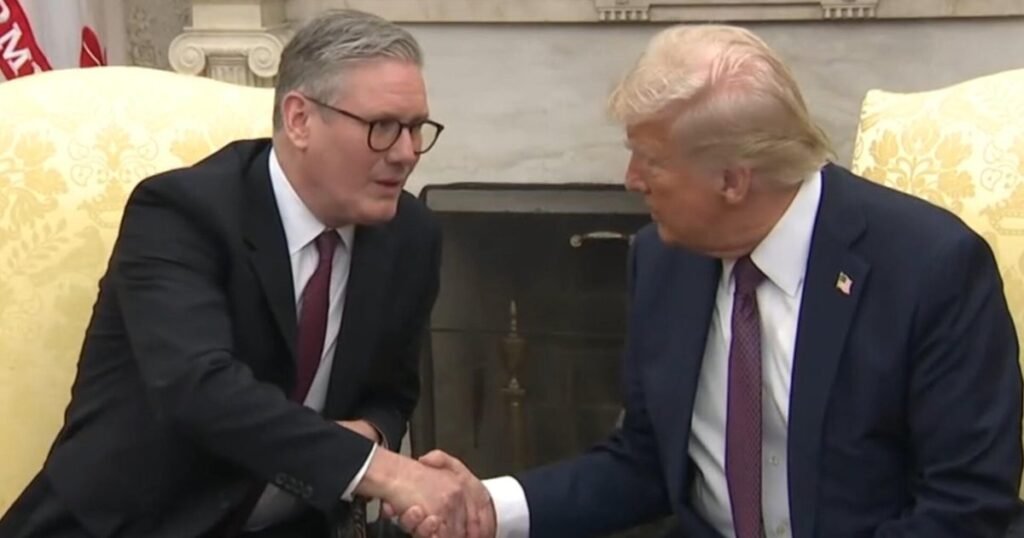President Trump on Thursday hailed his new trade pact with the U.K. as a “maxed out deal” that will serve as a template for agreements with other nations. But some experts are taking a dimmer view, noting that the U.K. agreement suggests high tariffs are set to remain in place for the long term.
Although the deal with Britain offers some concessions, a 10% tariff remains in place on U.K. imports. Mr. Trump unveiled that baseline levy, which serves more broadly as a minimum import tax on other nations, as part of his April 2 “Liberation Day” announcement.
White House spokeswoman Karoline Leavitt said Friday that the president is “committed to the 10% baseline tariff, not just for the United Kingdom, but for his trade negotiations with all other countries as well.”
While a 10% tariff rate is lower than some import duties Mr. Trump imposed on other nations last month, ranging from a high of 145% for China to 11% for the Democratic Republic of the Congo, it’s still far higher than the effective tariff rate of 3% prior to the second Trump administration, according to the Centre for Economic Policy Research, a nonpartisan policy think tank.
Paring Mr. Trump’s sweeping tariffs to 10% could offer some relief for U.S. businesses and consumers facing higher costs. But it still represents a major headwind for importers, which pay the duties on goods and then pass on all or most of the cost to consumers, economists say.
“Even with a slow rollout of trade deals over the coming months, you’re still going to have an effective average tariff rate that is going to be in the double-digit range,” EY chief economist Gregory Daco told CBS MoneyWatch. “What that means for businesses is that they’re simply going to be paying more for the same goods that they have been importing, and they’re going to be raising prices onto customers that have much less ability to withstand ongoing price increases.”
That, in turn, could cause Americans to tighten their wallets, a serious risk given that consumer spending accounts for roughly 70 cents of every $1 in economic activity. Businesses that are stressed by tariffs could slow hiring, leading to a pullback in household income growth, Daco said.
“Modest improvement”
The deal with Britain is “a modest improvement over what we had yesterday, but — with most U.S. tariffs still in place and very limited new U.K. liberalization — remains worse than the pre-Trump status quo,” Scott Lincicome, Cato Institute vice president of economics, said in an email.
The economic stakes for U.S. trade talks are high, with economists raising the chances of a recession due to fallout from Mr. Trump’s trade war. The stock market tumbled and U.S. Treasury prices slid in the days immediately following the president’s April 2 tariff announcement, underlining investor concerns that a trade war could torpedo economic growth.
Stocks closed modestly higher on Thursday after Mr. Trump announced the new trade agreement with the U.K.
While Wall Street has largely rebounded since then on growing investor optimism that the Trump administration will soon strike new trade deals, many Americans are souring on Mr. Trump’s policies. In a recent CBS News poll, 53% of those surveyed said they believe the U.S. economy is getting worse, while only 41% approved of the Trump administration’s tariffs.
Even as the U.S. tries to negotiate additional trade agreements, businesses continue to face significant risks, economists note. These stem from the ongoing uncertainty over the ultimate level and duration of tariffs, making it hard for companies who depend on trade to make plans on spending, hiring and their supply chains.
“Even if this tariff is lower, this fundamental anxiety related to uncertainty and unpredictability” remains,” said Han-koo Yeo, a senior fellow at the Peterson Institute for International Economics. “If this is not resolved or addressed, then I think it’ll be difficult for consumers, investors and business to fully recover.”
Even so, some experts note that the Trump administration’s efforts to strike new trade deals could provide some relief to investors and businesses, as long as there’s growing clarity about where the tariff policies could settle.
“Now, at least the wheels are in motion relative to discussions with a variety of countries, with the deal between the United States and U.K. as perhaps indicative of the fact that there could be tariff and trade-related de-escalation — even without a fully drawn out trade agreement,” noted Mark Luschini, chief investment strategist at Janney Capital Management.
Commerce Secretary Howard Lutnick told Fox Business on Thursday that the Trump administration is “focused on the big countries,” although he added that negotiations could drag out.
“The president doesn’t want to go fast,” Lutnick said. “He wants to do the kind of deal we did today, where we said, ‘Look, this is just a win for America,’ and we figured out how to make it a win for them.”
Key meeting with China
The U.K. is a fairly modest trading partner for the U.S., representing about $65 billion in annual imports, or less than one-tenth of annual imports from China.
Treasury Secretary Scott Bessent and U.S. Trade Representative Jamieson Greer are scheduled to meet with Chinese negotiators this weekend in Switzerland, and Mr. Trump signaled that he’s open to lowering tariffs on the nation’s goods from its current 145% level.
“80% Tariff on China seems right!” the president wrote Friday morning.
But that might not be enough to cushion the U.S. from the headwinds of higher tariffs, according to experts.
“Even if we were to see a continuation of the universal 10% tariff applied and some rollback of higher levels, or in the case of China, 145%, we’re still talking about a tariff rate that is the highest since World War II,” Luschini said. “And so it’s going to have an impact at some form.”

